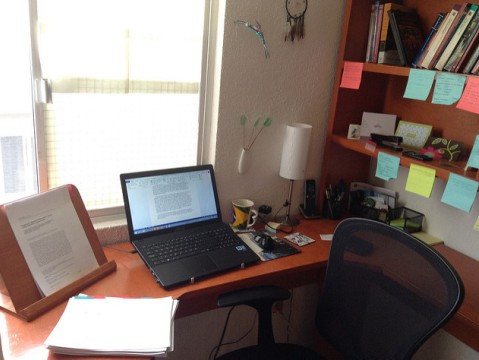Over the past several years, many a friend or acquaintance has expressed curiosity about how I came to start a startup—more so in my mid-30s. I would also hear from peers, younger alumni from business school, and budding entrepreneurs who wanted to know how I got the idea for my venture, how I decided to take the plunge, and how I went about assembling a team, raising the necessary capital, building a viable product, and growing the business.
The people asking were typically driven, hardworking professionals who were making a decent living. Plain curiosity apart, the conversations were usually motivated by one or more of the following stated desires: to start a venture of their own, to derive inspiration from my dogged path, to learn from my experiences and missteps, and to be better prepared to navigate the pitfalls likely ahead of them.
Often, the presumption would be that I had found my passion. Like many, they probably believed that the much-bandied-about “passion for an idea” was the #1 ingredient for starting a business. (After all, every business was once just an idea.) If they weren’t sounding me out on a fresh idea, they seemed to wonder where and how they would find theirs, so that they could be on their own way thereon!
Now, it was in early 2009, in the home stretch of my MBA program at the Chicago Booth School of Business, that the idea for what soon became Jodi365.com came to me. However, it was not the only startup opportunity that I was excited about. In the previous year, there were several other ideas that I explored, including an online marketplace for professional photographers, a packaged fruit drinks business in India, a belongings tracking device and system, and a mobile-enabled local price comparison service in India. (I could have been a poster child for “brain drain” out of India in the early/mid-90s, but 15 years later, despite having taken up permanent residence in the US and despite Sequoia Capital’s viral “RIP: Good Times” presentation, I was bullish about startup opportunities in general and in India, in particular.) I quickly came to be reminded that while an idea is important, what’s more critical for startup success is the execution of the idea.
Dreamers ideate, while doers execute. And that takes discipline. One must be willing to do the difficult things, things that are not necessarily enjoyable but essential. Like an athlete who aspires to be a champion, one must be willing to put in the grueling hours on the field – preferably under the watchful eyes of an expert. It takes perseverance. Yet, if passion is the #2 ingredient for starting a business, discipline is still at best #3.
The #1 ingredient for starting a startup, in my book, is this: Overcoming the fear of failure.
Reid Hoffman famously described an entrepreneur as someone who will jump off a cliff and assemble an airplane on the way down. Most people are just too afraid to jump! Most are too concerned about creating and maximizing optionality.
I haven’t forgotten what it was like to strive for optionality, myself, as in applying to join prestigious universities or reputed companies. It took some self-awareness – not acquired easily, unfortunately – to realize that I didn’t need a McKinsey, Goldman Sachs, or some other elite organization’s seal of approval. I could well channel Sean Parker’s character in The Social Network and ask, “You know what would be cooler than joining a well-known company? Founding one!”
Yet, it took some courage to get over the fear of jumping. Doubts and unknowns included:
- “Did I have what it takes to found and run a business?”
- “What of the many important things that I surely didn’t know?”
- “This is what I will come to be known for (‘Ha, matchmaker!’); would I be comfortable with that?”
- “How would I marshal the necessary resources to get this off the ground?”
- “How would I make ends meet until the business becomes profitable?”
- “What if it fails?!”
Others who have taken the entrepreneurial path may be able to recount similar imaginary or real fears. Others who have similarly jumped, regardless, will attest that it takes a strong will to deal with the many hurdles on this path.
The path may not be for everybody. It doesn’t have to be, either. When someone (usually another MBA graduate!) brings up the “opportunity cost” of starting a business—forgone wages, primarily—I am inclined to suggest that they hold on to their day job. They probably don’t have the startup DNA.
I’ll leave to others or for another time the topic of how to become an entrepreneur. I’ll just end with some tips on how to overcome the fear of failure.
- Learn how to assemble planes for others before you jump off and assemble yours. Apprentice with experts. Join a startup that has a strong culture of learning and mentoring.
- Jump off smaller cliffs. Practice jumping with a safety net. Safety net sizes and cliffs’ scariness are relative. Figure out your comfort level as you progressively work towards more challenging cliffs.
- Recall failures in your past, no matter how insurmountable they may have seemed then or insignificant in hindsight, and how you dealt with them. Then, visualize the worst that can happen in your startup future. Face those fears head on. You will probably be all right even if you were to fail again.
- Generally, don’t fear failure; embrace it. Don’t wish for a life of affluence and contentment, at least not while you are young. Indeed, as Raghuram Rajan said,
Lord, if there be shocks, let them be varied and preferably moderate ones, so we can stress test our systems.
It applies not only to financial systems but also to individuals.
Featured image: Dennis Skyley/Flickr
Editor’s Note:
You can also download our app from Play Store.
















































